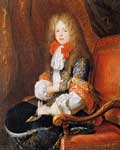Elisabeth Charlotte
|
 |
Elisabeth Charlotte, called Liselotte for short, was the only daughter of the Elector Palatine Karl Ludwig (1617-1680) and his consort Charlotte of Hesse - Cassel. Karl Ludwig was the eldest surviving son of Elizabeth Stuart (1596-1662) and the Elector Palatine Friedrich V. (1596-1652), who later became, briefly, the king of Bohemia (1619-1620). Karl Ludwig was thus the brother of Sophie (1630-1714), the electress of Hanover, whose daughter, the future queen of Prussia Sophie Charlotte (1668-1705), was named after her mother and Elizabeth Charlotte. Friedrich lost Bohemia as well as the Palatinate during the initial stages of the Thirty Years' War, but in accordance with the terms of the Treaty of Westphalia (1648), which ended the Thirty Years' War, Karl Ludwig regained the Rhenish Palatinate. In 1671 Elisabeth married duke Philippe I. (1640-1701) of Orléans and thus became the duchess of Orléans.
Although she was never to meet him, Elisabeth knew of the great philosopher Leibniz, who was the Privy Counselor and Librarian for the court at Hanover and a great friend and philosophical correspondent of both Sophie and her daughter Sophie Charlotte. Elisabeth also corresponded with Leibniz. In her last letter to him, written a few days before his death, Elizabeth expressed her sorrow at the thought that the old duchess of Celle, Eléonore d'Olbreuse (1639-1722)1 (who had just been visited by her granddaughter Sophie Dorothea (1687-1757), the queen in Prussia) still lived, while her beloved aunt Sophie was no more. When she heard the details of Leibniz's death on 14 November 1716, Elisabeth wrote to Friedrich von Harling,2 telling him that Leibniz had no need of priests about him, for they could teach him nothing, since he knew more than they did, and that she had no doubts about his salvation. Elisabeth obtained a short biography of Leibniz from his secretary Eckhart in order to provide a basis for the eulogy that Fontenelle (1657-1757) read to the Paris Academy of Sciences on 13 November 1717 in remembrance of the great Leibniz:
"Thus it was Sophie's niece, Liselotte (whom he had never met), who remained his most loyal friend among the great and secured for him in a foreign land the ceremonial recognition that his own countrymen had been either too indifferent or too bigoted to give." [Aiton, p. 350]
![]()
Notes
1Eléonore d'Olbreuse was the consort of duke Georg Wilhelm (1624-1705) of Brunswick - Lüneburg - Celle.
2Friedrich von Harling was the husband of the late Anna Katharina, who had been the governess of Sophie's children as well as of Elisabeth herself.
Sources
- The Encyclopædia Britannica, 13th edition. New York: The Encyclopædia Britannica, Inc., 1926.
- Aiton, E. J. Leibniz: A Biography. Boston: Adam Hilger, 1985.
- Hatton, Ragnhild Marie. George I: Elector and King. Cambridge, Mass.: Harvard University Press, 1978.
- Parker, Geoffrey. The Thirty Years' War. New York: Routledge & Kegan Paul, 1987.
Web





